Contents
- Do I need to prune gooseberries in the spring
- Types of trimming
- When can you prune gooseberries in spring?
- How to prune gooseberries in spring
- Tools and materials
- General rules for pruning gooseberries in spring
- How to prune gooseberries in spring: diagrams
- How to prune gooseberry bushes in spring when planting
- How to do sanitary pruning of gooseberries in spring
- How to form a gooseberry bush in spring
- How to prune old and neglected gooseberries in spring
- Spring pruning of the standard gooseberry
- How to form a gooseberry bush in spring when grown on a trellis
- Gooseberry care after pruning
- Conclusion
Gooseberries are an unpretentious and fertile crop that grows everywhere, which requires mandatory regular pruning. Fast-growing young shoots in a few years turn the bush into dense, impenetrable thickets that do not let in light. Pruning gooseberries in the spring for beginners in pictures will clearly show what and how to remove, so that the berry bush annually pleases with a rich harvest and a neat appearance.
Do I need to prune gooseberries in the spring
Gooseberries require regular pruning for a number of reasons:
- the rapid formation of young shoots thickens the bush, which becomes impermeable to light, as a result of which the gooseberries become smaller and their number decreases;
- dense interlacing of thorns contributes to the development of diseases and the reproduction of pests, which makes harvesting inconvenient;
- productivity also falls due to lack of nutrition, most of which is taken by new branches;
- the bush loses its shape, its long branches lie on the soil and take root;
- gooseberries are chosen by pests and diseases that become a threat to other nearby plants.
You can see how to properly prune gooseberries in early spring in the video for beginner gardeners:
Types of trimming
In the spring, the following types of pruning can be carried out on gooseberries:
- sanitary – to improve the bush with the removal of old, damaged, dry and diseased branches that interfere with normal growth and development;
- formative – for the correct formation of a compact shrub;
- rejuvenating – to stimulate the growth of new shoots.
A sanitary haircut is carried out annually, forming – at planting and 3 – 4 years after, rejuvenating – every 5 – 6 years.
When can you prune gooseberries in spring?
The ideal time for the formation of a gooseberry bush is spring, before the active growing season. The buds wake up very early, so the plant is pruned in early spring before the start of sap flow. Gooseberries are one of the earliest fruit crops that enter the active stage of vegetation after winter. Therefore, its pruning is timed to coincide with the time of complete melting of snow and slight drying of the earth. Depending on the region, this may be the beginning or middle of March. After bud break, the shrub cannot be cut off, this will significantly weaken its growth and development.
How to prune gooseberries in spring
Subject to the timing of pruning gooseberries in the spring, which is the most important stage in the formation, the next year the bush will please with numerous strong shoots. In general, pruning activities are simple and are divided into three main stages:
- Pruning after planting.
- Shrub formation for the next year.
- Spring revision of a three-year-old and older plant.
For the first 3 years of life, gooseberries are shaped, then they are looked after as an adult plant, that is, they annually carry out a sanitary and once every 5 years rejuvenating haircut.
Tools and materials
To trim the gooseberries, you will need a sharp pruner and a lopper, which must first be disinfected. To remove thin branches, use a secateurs, and thick ones, more than 5 cm in diameter, use a delimber. Tools should be with comfortable handles, durable and light in weight for ease of use. Processing of fresh cuts is carried out with a garden var, due to which they protect plant wounds from pests and infectious diseases. Perform work in gardening gloves.
General rules for pruning gooseberries in spring
The rules for pruning shrubs are as follows:
- sections are made 1 cm above the kidney, which is directed to the outside: growths from the kidneys directed inwards are not suitable for growth;
- lateral, extra shoots are cut off completely;
- old shoots are shortened to the place where they begin to grow;
- thin tips are cut off to a large kidney;
- do not prune in the summer and remove annual growths;
- black shoots are completely cut out: this color indicates infection with powdery mildew;
- branches that are far from the main part of the bush and very low placed are removed.
The cut should be located just above the kidney, directed to the outside of the crown. Most often, gooseberries are grown as a multi-stem bush with skeletal branches of different ages in the amount of 20-25 pieces. You can not touch 3 – 6-year-old shoots, on which most of the crop is tied.
How to prune gooseberries in spring: diagrams
Pruning gooseberries in the spring by year is clearly shown in the diagram below. However, when working, the following recommendations must be observed:
- to stimulate branching, the shoots of the first year are shortened, leaving several healthy buds, especially for weakened plants;
- weak branches are removed on strong, healthy bushes, since they will not bear fruit anyway;
- in the first year, the gooseberry should be with 3-5 buds and processes shortened by a third;
- all shoots growing in the wrong direction are removed the next spring;
- to form a voluminous crown on a two-year-old seedling, last year’s growths are cut by 1/3;
- leave up to 6 – 8 pieces of strong branches;
- the third year is an important period for the cultivation of gooseberries, which enters the fruiting phase. The pruning scheme is repeated: 3-5 strong shoots are left from the root shoots, young branches are shortened by a third of the length.
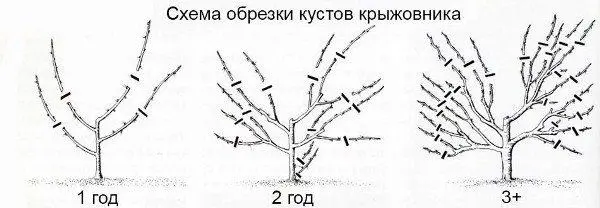
How to prune gooseberry bushes in spring when planting
Experienced gardeners carry out the first pruning of the plant before planting a young seedling. If it is strong and developed, then all branches are removed and several with healthy buds are left in an amount of not more than 4. On a weak seedling, annual shoots are shortened, leaving 2 buds on each. This will increase the branching of the bush. Weak branches are not left. If the first pruning of gooseberries in the spring when planting is done correctly, then by autumn the bush will have at least 5-6 annual, strong shoots. When in doubt, it is better to leave the branch than to cut it off.
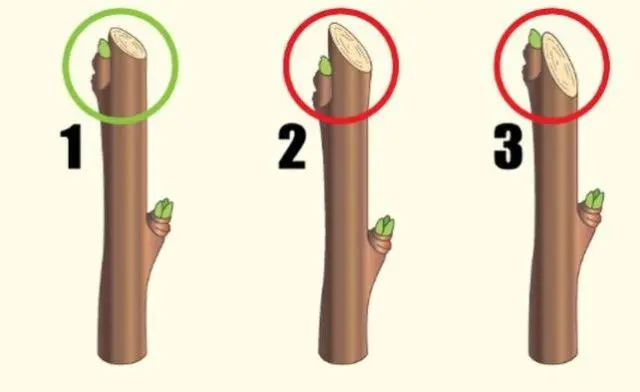
How to do sanitary pruning of gooseberries in spring
A plant that is older than 3 years is no longer formed, but only put in order with the help of sanitary or rejuvenating pruning for old bushes. Thus, annually during spring care, remove:
- frozen, dried and diseased branches;
- weak and thin, shoots, as well as those that creep along the ground;
- shoots growing inside the bush;
- old, dark-colored branches that are infected with powdery mildew or no longer bear fruit.
How to form a gooseberry bush in spring
The scheme for the correct formative pruning of gooseberries in the spring is as follows:
- up to 5 healthy buds with several zero shoots are left on the branches of the current year;
- a little more than half the length shorten these branches for the next year;
- the number of new processes should increase to 8;
- in the third year, the bush already forms about 12 branches, of which the processes of the current year are shortened and the 4 most developed ones are selected from the “zero” ones;
- by the age of five, a young gooseberry has branches of different ages in the amount of 20 – 22 pieces,
- old, with darker bark, branches begin to be removed from this moment.
This formative pruning method ensures regular growth of young shoots and good fruiting.
How to prune old and neglected gooseberries in spring
You can also prune an old gooseberry bush that “accidentally” lingered on the site in early spring. Initially, old, twisted, completely diseased, weak branches are selected. Dried tops on the remaining shoots are removed at the level of the first lateral process. At one time, you can not get rid of more than a third of the branches per season. Otherwise, the plant will get a lot of stress and will fight for survival, and not the formation of new shoots and a rich harvest. In very advanced cases, anti-aging spring pruning can be performed for several years. For such a pruning of an old gooseberry bush in the spring, all branches are cut off, leaving the five strongest and most powerful.
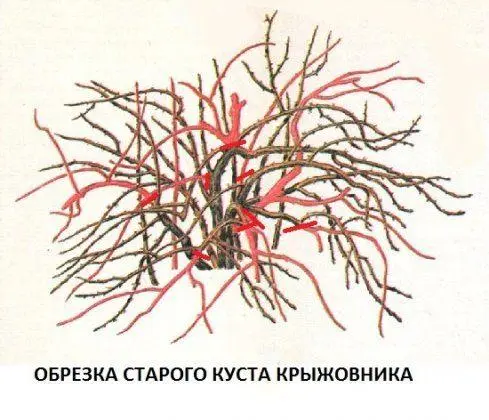
Spring pruning of the standard gooseberry
The formation of a gooseberry bush in early spring in the form of a trunk makes it look like a small tree. The step-by-step procedure for trimming looks like this.
- They choose a powerful vertical branch about 1 meter long and cut off the extra shoots, as well as those that have grown on the trunk.
- The stem is tied to a metal support to prevent it from bending.
- All side branches are removed during the season.
- The next year, last year’s growth is shortened to the middle of the length, leaving 5 strong branches.
- All improperly growing, inward or outward branches are removed.
- Young shoots around the trunk are completely cut off.
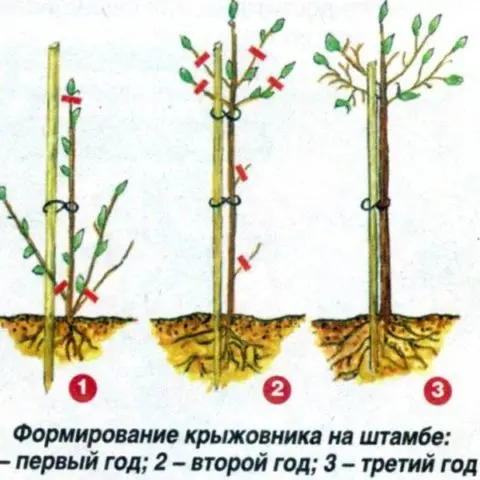
How to form a gooseberry bush in spring when grown on a trellis
Trellis growing berry crops also requires regular pruning. Form it in this way.
- From 3 to 5 powerful, strong branches are tied to the wire stretched in advance, after shortening them a little. All other shoots are removed.
- Branches from the middle of the bush are shortened to a greater length than the side ones. The shape of the trellis shrub should resemble a fan.
- Zero shoots are completely cut off.
- From the age of six, anti-aging pruning is carried out, replacing old shoots with new ones.
A helpful video will explain in detail how to properly prune gooseberries in the spring so as not to harm them and ensure a good young growth.
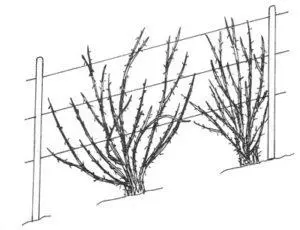
Gooseberry care after pruning
Trimming a young or neglected gooseberry in the spring is a simple matter, but after that it is important to provide good care to the plant for quick recovery and healing of wounds. Fresh cuts are covered with garden pitch or a mixture of mullein and clay in a ratio of 1 to 2. After pruning, the plant needs abundant watering and fertilizing with phosphorus-potassium fertilizers. It should be carried out regularly – once a week, periodically changing to the application of organic fertilizers. For example, slurry diluted with water in a ratio of 1 to 10. The bush will react positively to abundant regular watering, especially in dry summers. It is also necessary to mulch the near-stem circle with peat, humus or fallen leaves.
More information about pruning gooseberries in the spring will let you know the video for beginners:
Conclusion
Pruning gooseberries in the spring for beginners in pictures will make it easy to cope with the obligatory agricultural technique for caring for berry crops. Detailed instructions and a reliable tool will make it possible to grow a fruit-bearing, fruitful, neat-shaped shrub. Due to its characteristics, it quickly, during the year, builds up young shoots, so what is cut off will be replenished in the same season.









